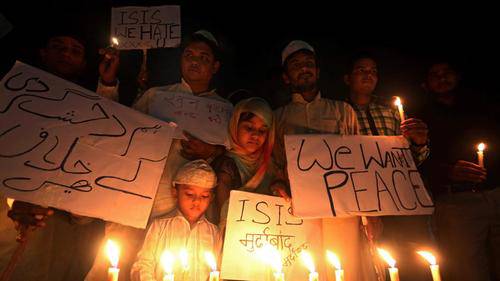
Terrorism in the name of religion is a threat to all – including Muslims
There is never any justification for callous attacks, such as those that have taken place recently in France, Austria and Saudi Arabia. This time it was in these countries; on many other occasions citizens in other parts of the world were the ones targeted.
All leaders across continents and regions need to continue joining forces to counter hate speech and combat terror.
The recent terror attacks in Europe targeted the foundations of our societies. It is far from the first time that terrorists have sought to tear societies apart.
As done in the past, we want to join forces with all our partners to fight this threat with unity and determination. Free speech is a cornerstone of our values and we will protect and uphold it, while of course rejecting hate speech and incitement to violence.
The place and role of religion may be different in different parts of the world, and we need to be attentive where people feel hurt. But everybody appreciating and protecting human life agrees that murder can never be justified – no matter how seriously one might feel offended or disagree with somebody else’s views.
In the aftermath of the attacks, there was a lot of discussion on the origins of this miserable violence and it is necessary to identify precisely the kind of terrorism we are facing. Because the perpetrators and supporters claim to carry out these acts in the name of religion, it is often referenced in relation to it.
However, this identification is plainly wrong: such terrorist attacks only reflect the violent extremism of a few radicals, seeking false justifications for their folly in a religion.
We live in a world in which identity is often used politically to create antagonism between groups and communities, including inside Muslim societies. As is well known, the majority of victims of terrorism are Muslims, killed by hideous terrorists abusing the very principles of the religion they pretend to adhere to, while in fact serving a nihilistic political ideology. We need to continue promoting inclusive societies, free from discrimination and stereotyping, hatred and stigmatisation based on religion and belief.
This was clearly expressed by the numerous governments, political and religious leaders, who have spoken out and condemned these murderous terrorist attacks while underlining the importance of peaceful coexistence.
In past centuries, Europe has lived through wars of religion, and suffered enormously from different forms of violent extremism. Today, the EU protects all religions and the freedom of everybody to believe and practice faith, or choose not to, and it will continue to do so. We defend this for Muslims, as well as for the believers of other faiths and for atheists.
The recent attacks are not necessarily the work of highly organised terrorist networks, as was the case in the past. With the co-operation of all countries, especially in the Muslim world, the fight against Al Qaeda and ISIS has made important progress. The current terrorist wave in Europe seems to be more the acts of individuals, who became radicalised online.
A great deal of false information has been disseminated around the globe about the situation of Islam and Muslims in Europe. Some groups have pushed social media campaigns, in particular against France and its leaders, calling for a boycott of French products. Some have even called for, or expressed understanding, for violence and murder.
This is unacceptable, as was also expressed by many voices worldwide: it only further fuels violence and hate – in Europe and globally. The strong pushback against this was another illustration of the willingness to work together.
Let us be very clear: the clash is not between Islam, a faith shared also by millions of European citizens, and other beliefs. It is not a “clash of civilisations”, but a clash between civilisation and barbarism, between the respect for life and nihilistic terrorism.
To meet the deadly challenges of terrorism, violent extremism and hate speech we cannot succeed alone. We need to work hand in hand with our partners around the globe – everywhere.
We need a sense of shared responsibility to combat hate and terror. This is a fight we need to win together, because we are all victims of it.
Source: The National News





